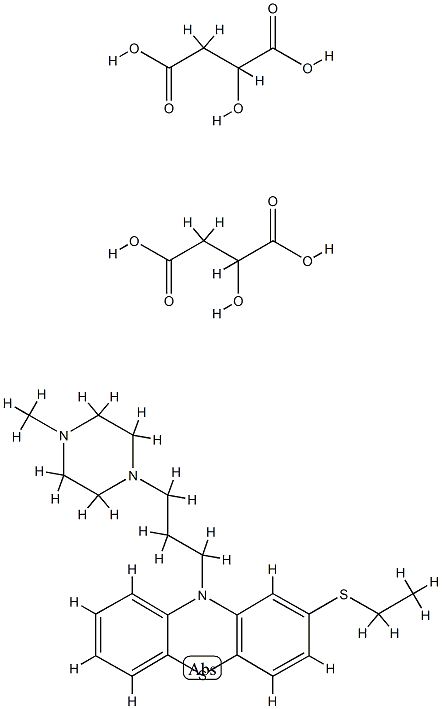Originator
Torecan,Boehringer Ingelheim,US,1961
Manufacturing Process
26.1 parts of 3-ethylmercapto-phenothiazine (melting point 95°C to 97°C),
4.7 parts of finely pulverized sodium amide and 120 parts by volume of
absolute xylene are heated to boiling for two hours, under reflux and while
stirring the reaction mixture, at an oil-bath temperature of 180°C. Without
interrupting the heating, a solution of 20.0 parts of 1-methyl-4-(3'-
chloropropyl-1')-piperazine (boiling point 95°C to 97°C at a pressure of 10
mm Hg) in 20 parts by volume of xylene is added dropwise in the course of 1
1/2 hours. After heating 3 more hours, the reaction mixture is cooled and
10.0 parts of ammonium chloride added; the mixture is then shaken out three
times, using 50 parts by volume of water each time. The xylene solution is
extracted with 250 parts by volume of aqueous tartaric acid of 15% strength,
after which the tartaric acid extract is washed with 80 parts by volume of
benzene and then rendered phenolphthalein-alkaline by the addition of 60
parts by volume of concentrated aqueous caustic soda solution. The base
which precipitates is taken up in a total of 150 parts by volume of benzene;
the benzene layer is dried over potassium carbonate and is then evaporated
under reduced pressure. The residue from the evaporation is distilled in a high
vacuum. After separating a preliminary distillate which passes over up to
226°C under a pressure of 0.01 mm Hg the main fraction - 3-ethylmercapto-
10-[3'-(1''-methyl-piperazyl-4'')-propyl-1']-phenothiazine - which distills at
226°C to 228°C under the last-mentioned pressure is collected. The
analytically pure base boils at 227°C under a pressure of 0.01 mm Hg and
melts at 62°C to 64°C.
Upon the addition of ethanolic HCl to a solution, cooled to 0°C, of 26.38 parts
of the free base in 130 parts by volume of absolute ethanol, until a Congoacid
reaction is achieved, the crystalline dihydrochloride of 3-ethylmercapto-
10-[3'-(1''-methyl-piperazyl-4'')-propyl-1']phenothiazine is precipitated. The
analytically pure salt has a melting point of 214°C to 216°C (bubbles); it
begins to sinter at 205°C. The dimaleate melts at 188°C to 190°C after
sintering from 180°C (recrystallized from methanol).
